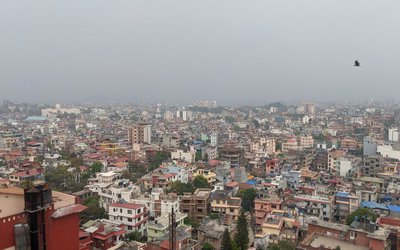In the wake of reports that Nepal’s trade deficit – in terms of trades in goods – has reached Rs 287 billion in the last one year, another disturbing trend has caught little attention.
The trades in services – which include country’s import and/or export of such services like tourism, travel, banking, insurance, education etc – has registered an astounding loss of Rs 21 billion in the last one year.
This figure is up by two and a half times compared to the figures a year ago.The latest report of soaring deficit in service trade is in line with the disturbing trend of country’s expenditure far outstripping its income.
In fact, even though Nepal has always been suffering from deficit in trades in good, the trades in services was a different matter altogether – at least till a few years ago when it used to have surplus in service trade.
But now, the tables have turned – for worse.
The difference between the travel income from the incoming tourists and travel expenditure incurred by the Nepalese who go overseas is the most pressing point, according to central bank officials.
“Though the number of incoming tourists has increased, the income from tourism has decreased. On the other hand, a large number of Nepalese are going overseas for works. This has resulted in net loss in travel. This is an unhealthy trend,” he said.
Many say that the loss in service trade is one of the key reasons why Nepal faced loss in Balance of Payment (BoP) this year.
“Service used to be a sector where Nepal registered profit till a few years ago. Now even this sector is in loss. This is creating frightening situation in BoP,” said Deependra Bahadur Chhetri, former governor of NRB.
The loss in service trade jumped from Rs 8 billion last year to Rs 21 billion this year. And one of the primary factors leading to this loss is said to be the money Nepalese students spent in paying foreign educational institutions.
Data show that they have spent over Rs 11 billion in paying foreign education institutions last year alone – up from Rs 10 billion previous year.
So what does this mean for the economy?“We are heavily dependent on imports. Our manufacturing sector is weak. Our expenditure has not decreased whereas our income has decreased. This is directly threatening the stability of the economy,” said economist Tula Raj Basyal.
If the loss in service trade is not corrected soon, the BoP loss which is coming down in recent months could again increase. Governor of Nepal Rastra Bank (NRB) Dr. Yubaraj Khatiwada has said that this difference is around Rs 10 billion already.
“Though the number of incoming tourists has increased, the income from tourism has decreased. On the other hand, a large number of Nepalese are going overseas for works. This has resulted in net loss in travel. This is an unhealthy trend,” he said.
Many say that the loss in service trade is one of the key reasons why Nepal faced loss in Balance of Payment (BoP) this year.
“Service used to be a sector where Nepal registered profit till a few years ago. Now even this sector is in loss. This is creating frightening situation in BoP,” said Deependra Bahadur Chhetri, former governor of NRB.
The loss in service trade jumped from Rs 8 billion last year to Rs 21 billion this year. And one of the primary factors leading to this loss is said to be the money Nepalese students spent in paying foreign educational institutions.
Data show that they have spent over Rs 11 billion in paying foreign education institutions last year alone – up from Rs 10 billion previous year.
So what does this mean for the economy?“We are heavily dependent on imports. Our manufacturing sector is weak. Our expenditure has not decreased whereas our income has decreased. This is directly threatening the stability of the economy,” said economist Tula Raj Basyal.
If the loss in service trade is not corrected soon, the BoP loss which is coming down in recent months could again increase.
- TANAHU HYDROPOWER PROEJCT: A Significant Achievement
- Apr 15, 2024
- AMBASSADOR HANAN GODAR: Sharing Pain With A Nepali Family
- Mar 30, 2024
- VISIT OF KfW AND EIB TO NEPAL : Mission Matters
- Mar 25, 2024
- NEPAL BRITAIN SOCIETY: Pratima Pande's Leadership
- Mar 24, 2024
- NEPAL ARMY DAY: Time To Recall Glory
- Mar 15, 2024
















